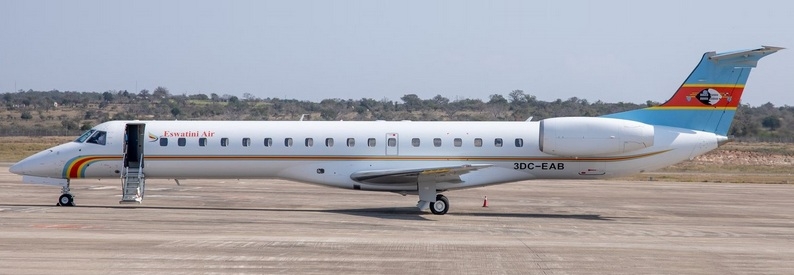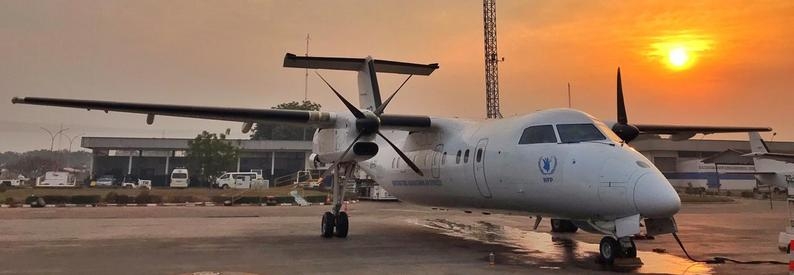Eswatini Air - the new regional airline brand of state-owned Royal Eswatini National Airways (RENAC) – plans to debut by the end of 2Q22 on Southern African regional routes using two EMB-145EPs, according to Commercial Director Xavier Masule.
He told ch-aviation the airline was hoping to obtain its Air Operator's Certificate (AOC) from the Eswatini Civil Aviation Authority (ESWACAA) by the end of this month.
As reported previously, RENAC last year purchased two 50-seater E145s previously operated by HOP! (France) (A5, Paris CDG). Masule disclosed they are 3DC-EAA (msn 145043) delivered to the Kingdom recently; and F-WTAF (msn 145152) currently in Johannesburg O.R. Tambo, South Africa for small refurbishments, whereafter it will reposition to Eswatini in a few weeks.
Eswatini Air will operate as a regional airline, connecting from Manzini King Mswati III International to four regional destinations initially: Johannesburg, Durban King Shaka, and Cape Town International in South Africa; and Harare International in Zimbabwe. He said the exact frequencies had not yet been finalised.
The airline has no intercontinental aspirations but wants to gradually open more destinations in a three-to-four hour radius in the sub-Saharan region. It will seek to connect to major regional hubs, such as Nairobi Jomo Kenyatta and Kigali, he said, and establish codeshares and interline partnerships with international airlines serving them. As the airline grows, it will extend its range and up-gauge but will aim to operate a simplified fleet for cost efficiency.
RENAC, established in 1978 as Royal Swazi National Airways (Manzini Matsapha), is wholly owned by the Kingdom of Eswatini. It also offers air charter brokerage and airport ground-handling services, supplies jet fuel, and operates a travel agency, Royal Eswatini Travel Agency (RETA), with outlets in Mbabane, Manzini Matsapha, and downtown Manzini.
Mashule said plans to resurrect the airline first formed four years ago. A five-year strategic plan approved during the first quarter of 2021 was based on the mandate to establish a national airline that would meet the Kingdom's s national socio-economic development goals, provide air connectivity, and stimulate tourism to the tiny country surrounded by South Africa.
The Eswatini government - through another government unit, the Ministry of Public Works and Transport - holds a 60% controlling share in Eswatini Airlink (Manzini Matsapha), a joint venture company with Airlink (South Africa) (4Z, Johannesburg O.R. Tambo), which operates the flights on Eswatini Airlink's behalf. The airline currently has a 100% market share at Manzini Matsapha in terms of weekly seat capacity, ch-aviation Commercial Aviation Operator Capacity Data data shows. It took over as Swaziland Airlink (Manzini King Mswati III International) from Royal Swazi National Airways in 1999 and became Eswatini Airlink when the Kingdom changed its name in 2018.
Asked why the government needed another airline when it already controls Eswatini Airlink, Mashule said RENAC functions as a separate entity even though it is state-owned. "We see Eswatini Airlink as a potential competitor, but also as a potential partner for codeshares and interlines, as Airlink has a wide regional network," he said.
The creation of Eswatini Air appears to be the result of shareholder conflict, according to well-placed sources. Attempts by the Ministry of Public Works and Transport to move their shareholding in Eswatini Airlink into RENAC failed, resulting in RENAC moving ahead with plans for its own carrier.
Airlink Chief Executive Officer and Managing Director Rodger Foster sees potential conflict of interest. "I don't see a market big enough to sustain both," he told ch-aviation in a recent interview. "But those things are matters that need to run their course, and in the meantime, Airlink South Africa is the fundamental de facto operator of the service, and it will continue providing the services, regardless of what happens with RENAC, the conflict of interests and so on. So we do not see that there will be an interruption of those services. Those services will continue," he stated.
Foster believed the government aimed to position King Mswati III International Airport (also known as Sikhuphe Airport) as a sub-regional hub to Johannesburg. The airport serves Manzini, Eswatini's second-largest city and its industrial and commercial hub. Still, it is located in rural Eswatini, more than 50km - a 40-minute drive - from Manzini and about 80km from the capital, Mbabane. Its ZAR3 billion rand (USD199 million) construction has been controversial from the start. Critics pointed to other international airports within a 400km radius, while the International Monetary Fund advised against it, saying it diverted much-needed resources away from meeting the country's social development needs. About 40% of Eswatini's 1.2 million population was estimated to have lived under the international USD1.90 a day poverty line in 2016 and 2017, according to World Bank statistics.
- Type
- Base
- Aircraft
- Destinations
- Routes
- Daily Flights

